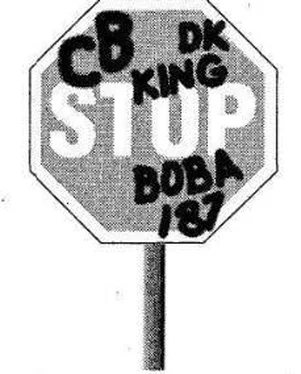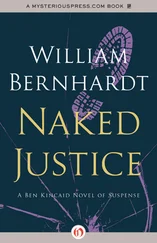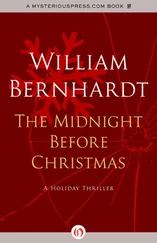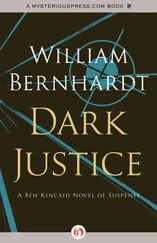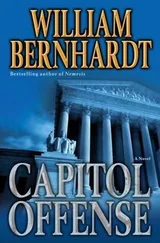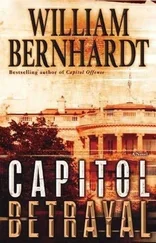“But that’s just it—I don’t know. He was facing away from me.”
Ben knew he had to follow up quickly, before the jurors’ interest became irritation. “Could you describe him?”
“He seemed tall. At least six feet, or close. Medium build.” She took another deep breath. “And he was white.”
Hallelujah. “Are you sure about that, Carlee?”
“Oh yes. He was only about ten feet away from me.”
“Is it possible there was a trick of the light that distorted his skin color?”
“No. He was a white man.”
“Thank you.” The good stuff was over, but Ben knew what this witness’s principal weakness was. Trial Tactics 101 told him it would be smarter to expose it himself than to let Bullock make a fuss about it during cross-ex.
“Carlee, since you were an actual eyewitness to this murder, why haven’t you come forth before now?”
Carlee turned to the jury and offered them her most sincere expression. “Well, until recently … I didn’t remember.”
“You didn’t remember? You forgot?”
“I don’t think it was that I forgot so much as that”—she struggled for the right words—“… I blocked it out.”
Ben checked the jury. A few expressions of skepticism, but no out-and-out disbelief. So far, so good. “What caused you to remember?”
“Well, that’s difficult to explain. I was on a camping trip with my family—my husband and my two boys. I heard a radio report about this case … then later, my husband hurt himself while he was showing the boys how to use a knife properly. It was a small cut, but it bled like crazy. The blood got all over him, and the smell permeated the air, and—”
She looked down suddenly, as if trying to drag the memory out of some cerebral cellar. “And then I remembered. Just for an instant. I flashed on that poor woman, screaming, blood spurting all over her. It was like I was back there, if only for an instant.”
“And you realized you were seeing a memory you had suppressed?”
“Not at first. But the next day I saw my husband chopping firewood. From behind, he resembled the man in the caddy-shack. He raised his weapon over his head and brought it down hard, and—” She looked up suddenly. “That’s when I knew. I saw the whole thing again, front to back, like a movie played out before my eyes. Except this was real. It happened. I was there.”
Good enough. That should give the jurors something to think about and, with any luck, would provide the first kernel of a reasonable doubt. “Thank you, Ms. Crane. No more questions at this time.”
All eyes in the courtroom passed to Bullock, who sat at his table stroking his chin. For a man who had just heard a surprise eyewitness testify, he seemed singularly undisturbed.
Bullock rose to his feet. “No questions, your honor.”
Judge Hawkins himself was caught short this time. “No questions? You mean—you’re not going to ask her anything?”
“No, your honor.” Bullock lowered himself to his seat. “The defense may call its next witness.”
What in the …? Ben stared at his opposite number, utterly flabbergasted. What did he think he was doing? Not crossing an eyewitness? It was crazy! Was he throwing in the towel?
Ben knew better. Bullock would never give up. The only reason he would pass on cross-examination was … if he didn’t think it was necessary.
Now that was a disturbing thought. Unfortunately, Ben didn’t have time to dwell on it.
“Call your next witness,” the judge ordered.
“Very well,” Ben said. He helped Carlee down from the stand and asked her to wait in the gallery in case he needed her later. “The defense calls Dr. Emil Allyn.”
66
AS WITH ANY EXPERT witness, the first twenty or thirty minutes of Dr. Allyn’s testimony were spent establishing his credentials and getting him qualified as an expert. Ben probably drew it out longer than necessary, but he was taking no chances. He had barely had time to provide the doctor with a rough outline of the subjects they would cover; there was no time to polish.
To Ben’s happy surprise, Dr. Allyn performed sensationally. His demeanor was superb and his answers were lucid and concise. He came across as authoritative, but not overbearing; confident, but not egomaniacal. And his professional qualifications and publications on the subject of repressed memory were so extensive they couldn’t be seriously challenged. Even by Bullock.
Once Dr. Allyn’s expertise was established, Ben launched into the heart of the matter—giving Carlee’s testimony the strength of scientific credibility. “Dr. Allyn, can you explain to the jury what is meant by psychogenic amnesia?”
The doctor shifted his gaze to the jury box. “Psychogenic amnesia occurs when a person participates in or witnesses an event so frightening or threatening or guilt provoking that the individual blocks it out of his or her memory to avoid reliving that terrible moment.”
“What kind of events could cause this reaction?”
“Any shocking, horrible occurrence. One common cause is child abuse, physical or sexual. Evidence is mounting that such abuse is far more common than we in the psychiatric community realized, because many of the victims subsequently shut the horror out of their minds.”
“What if a seventeen-year-old girl witnessed a gruesome, violent murder? Would that be sufficient to induce psychogenic amnesia?”
“Given the right circumstances, it could well be.”
“Psychiatrically speaking, how would such an event occur?”
“First, you should understand that traumatic memories form in an altered state of consciousness in which the laws of ordinary memory do not apply. A blanket of amnesia can cloak memories of these intense, violent experiences, particularly when they occur while the person is still a minor. The memory remains suppressed until an adult experience pierces the veil.”
“Would that adult experience be something equally intense?”
“Usually not. No, in most cases, the event is something perfectly ordinary that nonetheless jogs the memory and unlocks the closed door.”
“For instance, seeing something visually similar to the crime?”
“Correct, but this recovery phenomenon isn’t limited to visual input. We have five senses, after all. As you may know, our sense of smell is the most acute of the five, and it is also the sense most closely linked to memory. A familiar smell can recall a past event more readily than any of the other senses.”
The foundation was laid. “Dr. Allyn, do you know a woman named Carlee Crane?”
“Yes. I had a private consultation with her earlier today. And of course I heard her testify.”
“As you know, she testified that she witnessed a murder, repressed it, and was then reminded of it by several events that occurred while she was camping with her family. Doctor, I know you weren’t at the caddyshack the night of the murder, and you can’t possibly say with certainty what Carlee saw. But let me ask you this. Is what she described to the jury possible?”
“Her tale of repressed memory is in complete conformity with the current research on this subject.”
“So her teenage mind might have repressed that bloody murder?”
“That is consistent with psychiatric opinions on this subject.”
“And the incident at Turner Falls, where she saw her husband hurt himself, might have reawakened the memory?”
“Even more than seeing—smelling. Remember, she testified that she detected the sickly sweet smell of blood. That’s an unusual, pungent odor—and one she might reasonably not have experienced during the intervening ten years. That may have been enough to bring the memories back.”
Despite the relative lack of preparation, this testimony was proceeding even better than Ben had hoped. “To your knowledge, doctor, has the legal community addressed this issue?”
Читать дальше
